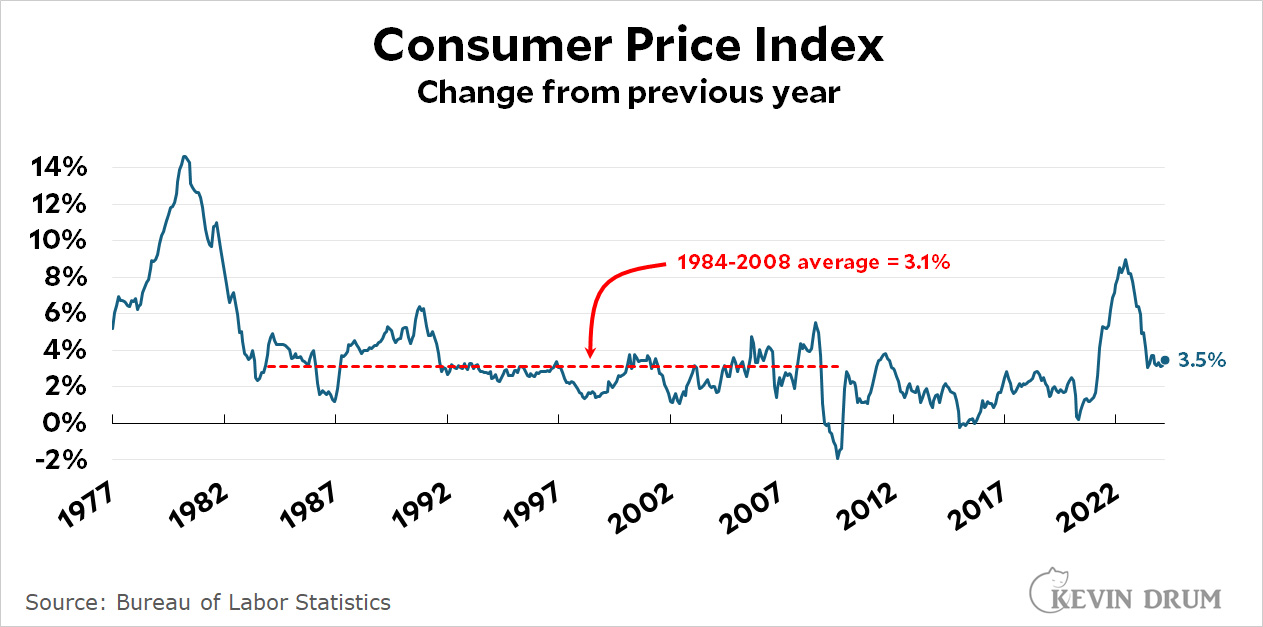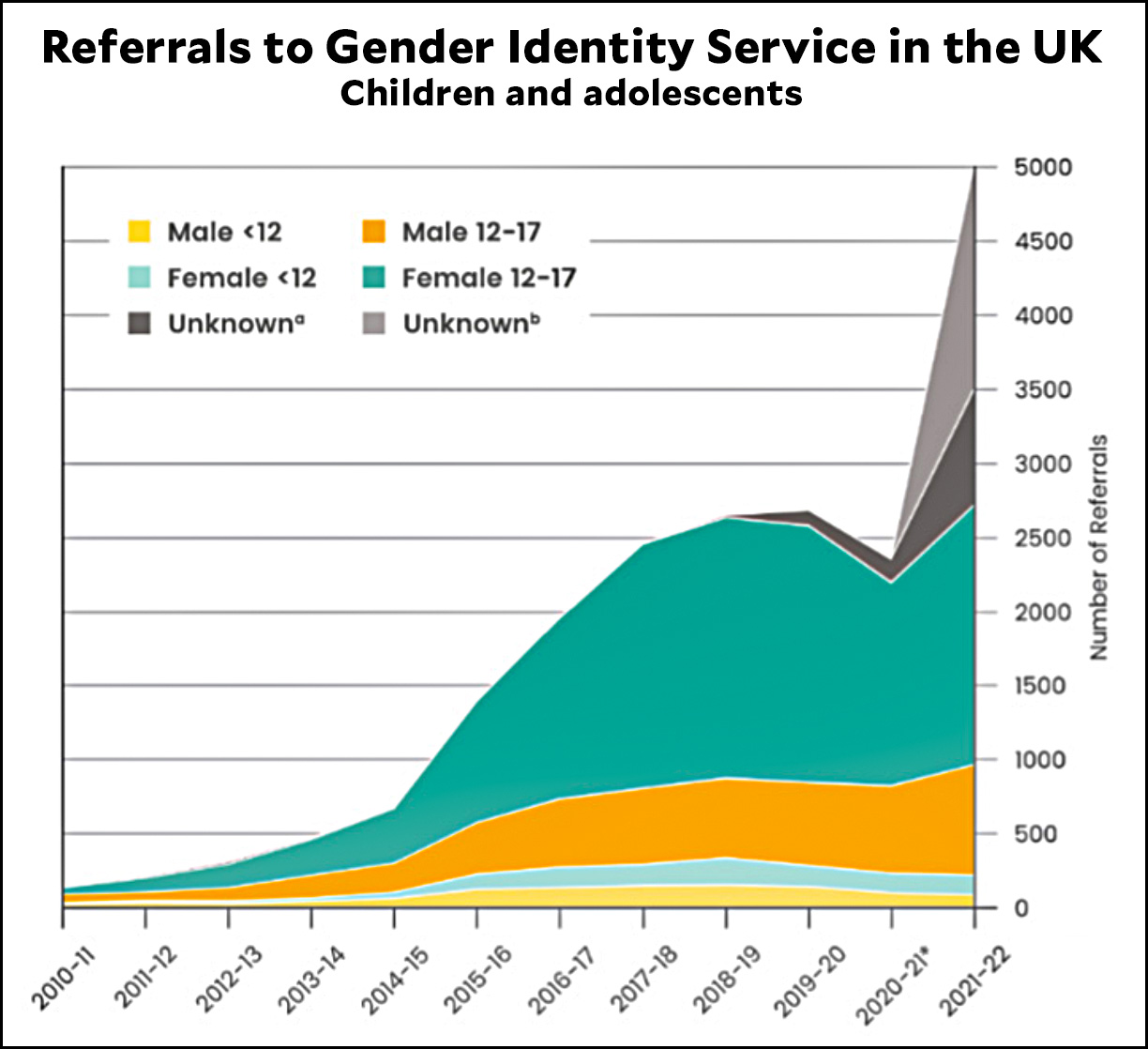Shrimp boats in Louisiana.

Cats, charts, and politics

No one likes a high inflation report, but the panic over yesterday's number is a little out of hand. Here is CPI inflation since the late '70s:
 There's a huge amount of noise in the monthly CPI numbers. What's more, we got used to ultra-low inflation in the decade following the financial crisis. Average CPI from the end of the '70s inflation to the start of the financial crisis was 3.1%. We're only barely above that right now. It's hardly a crisis.
There's a huge amount of noise in the monthly CPI numbers. What's more, we got used to ultra-low inflation in the decade following the financial crisis. Average CPI from the end of the '70s inflation to the start of the financial crisis was 3.1%. We're only barely above that right now. It's hardly a crisis.
Still, why the flattening over the past half year? Aside from noise, my guess is pretty simple: wages generally lag inflation, and lately they've been growing a couple of points above CPI. That pulls up the inflation rate a bit, but it will calm down before long and inflation will continue to decline.
Also housing prices, which are stubbornly staying fairly high. That can't last forever, can it?
The 99 Cents Only chain is closing up shop. LA Times columnist Gustavo Arellano headed out to talk to a few customers about it:
“I blame [Gavin] Newsom,” said Rick Juarez, 53, referencing the California governor as he entered the store to stock up on batteries. He had shopped at this location for “at least” 20 years. “Too many taxes, too high the minimum wage. These companies just can’t compete, and so they have to close. And it’s poor people like us who end up suffering.”
I know, I know: this is just one random guy. Who cares? But it's hard to get so many things wrong in such a short comment:
But sure, blame Newsom. Why not? Someone on the radio probably says everything is all his fault.
Donald Trump says he's in favor of states deciding abortion policy for themselves. Unless, that is, they're getting a lot of damaging attention for it:
Former President Donald Trump said Wednesday that Arizona went too far after the state’s high court issued a ruling outlawing abortion.... “Arizona is definitely going to change, everybody wants that to happen,” Trump said after greeting supporters at the Hartsfield-Jackson Atlanta International Airport.
Does Trump think Arizona is the only state in the union with a total abortion ban? It's not. So does he also think that Alabama has gone too far? Arkansas? Kentucky? Louisiana? Missouri? Oklahoma? South Dakota? Tennessee? Texas? Will anyone ask him?
In related news, Trump also says he wouldn't sign a nationwide abortion ban if he were president. But this doesn't mean much. I think we can assume he's just lying here, as he usually does.
As time goes by, I've gotten less and less interested in studies showing how good modern AI is. Many of them are fascinating, but I want to see real-world examples. Today, the New York Times says Wall Street is about to start replacing junior financial analysts in enormous numbers:
The jobs most immediately at risk are those performed by analysts at the bottom rung of the investment banking business, who put in endless hours to learn the building blocks of corporate finance, including the intricacies of mergers, public offerings and bond deals. Now, A.I. can do much of that work speedily and with considerably less whining.
....The software, being deployed inside banks under code names such as “Socrates,” is likely not only to change the arc of a Wall Street career, but also to essentially nullify the need to hire thousands of new college graduates.
Fine. It was bound to happen. But if Wall Street investment banks stop hiring entry level analysts, where will they get their associates and directors and managing partners? There will be no one to move up the ranks.
This is maybe not the biggest issue with AI, but it's a very general one since it's the grunt jobs AI will take over first. Where will all the senior reporters and senior bookkeepers and senior coders come from if AI fills all the junior ranks?
The Cass Review, a comprehensive study of adolescent gender care in the UK headed by Dr. Hilary Cass, a consulting pediatrician, was released today. I lack the expertise to evaluate it critically, but here are the points that jumped out at me:

One of the major themes of the report is the toxicity of the gender debate:
The single biggest throughline in the Review is that we have high-quality evidence for almost nothing, one way or the other. Anyone claiming that the science is settled is badly misrepresenting things.
This is an orangutan at the LA Zoo. Doesn't he look old and wise? I mean, we've all seen the movies. We know that orangutans are the smartest of the apes, right?
This was a hard picture to take because the orangutans were behind glass that hadn't been cleaned for at least a few months. I kept moving around trying to find a tiny clean spot to shoot through, and I did eventually. Sort of clean, anyway.

Now that elite opinion has coalesced around the idea that Israel has (caveat caveat caveat caveat) gone a bit too far, I really would like someone to explain what changed between January (let alone October) and April?
I'm just a simple city blogger and my opinion was clear from the beginning: whatever the conflict, de-escalation is alway the right guiding principle.
I've been more muddled about Gaza than Atrios, so I suppose this deserves an answer. And honestly, I think the answer is fairly simple. It's gone something like this:
If you already loathed Israel, or never thought Hamas was that big a threat, then of course you would have opposed Israel's scorched-earth war from the beginning. That makes sense. But if you agreed that October 7 made the case for destroying Hamas overwhelming, you'd be inclined to give Israel a lot of leeway in its conduct of a difficult war.
But a lot of leeway is not infinite leeway. As the threat of starvation in Gaza became ever more apparent, that leeway began to tighten. Killing the WCK aid workers then crystallized it.
From Gen. Christopher Cavoli, commenting on the dire situation in Ukraine:
The side that can’t shoot back loses.
It's disgraceful that we've given up on Ukraine, and it's beyond disgraceful that this is largely because the Republican Party is following the lead of Donald Trump, who has a personal beef with Ukraine because they refused to submit to his demand that they dig up dirt on Joe Biden. Show a little backbone, folks.
A few days ago Damon Linker wrote a piece for the New York Times claiming that America is broken, and this is why people are so unhappy right now.
Linker makes his case by cherry picking a laundry list of bad things that have happened recently, and he's certainly right about some of them. Iraq was a disaster and the 2008 banking crisis exposed some deep problems in our financial system. On the other hand, I don't think he's right that our response to COVID-19 was shambolic or that our withdrawal from Afghanistan was humiliating. And he's flat wrong about homelessness: it's declined over the past decade.
And I can make my own list. Wages are up, unemployment is down, inflation has subsided, GDP is the best in the world, crime is declining, teen pregnancy is down, the uninsured population is down, we created a COVID vaccine from scratch in only ten months, vacation travel is skyrocketing, and everyone loves playing pickleball.
Nor is Linker right to say that we've failed to even respond to our failures. We passed a huge financial reform bill after the financial crisis. We've withdrawn from Iraq and been cautious about committing troops to other wars ever since. The Fed responded to inflation and Congress kept people solvent during the pandemic. Obamacare has addressed the health care crisis. A thousand people have been tried and convicted of the January 6 insurrection and Donald Trump will soon be one of them.
But put that all aside. We can agree to disagree. Because none of this matters unless people are, in fact, deeply unhappy these days. Our old friend YouGov asks about this every week and tells us this:

 Over the past four years, reported satisfaction has gone up, happiness has gone up, and sadness has gone down. In addition, boredom, stress, frustration, and loneliness are also down.
Over the past four years, reported satisfaction has gone up, happiness has gone up, and sadness has gone down. In addition, boredom, stress, frustration, and loneliness are also down.
Every four years someone tells us that this time people are really fed up with Washington. Maybe so. It's certainly true that people are increasingly unhappy with politics. It's also true that both the far right and far left are united in a sense of catastrophism. But there's not really a lot of evidence that this has changed voting patterns in the middle, and there's definitely no evidence that people overall are less happy or less satisfied with their lives than they've ever been. What does it take to pound that message home?